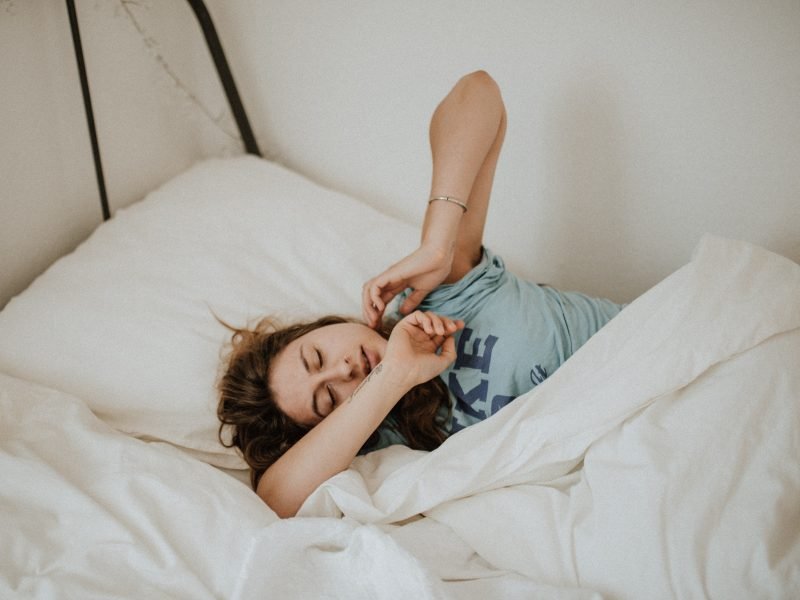How To Cultivate A Bedtime Routine For Restful Sleep Every Night

Whether you’re a night owl or morning person, we all have different routines that can affect our sleep patterns. With sleep taking up about one third of every day, it’s a pretty important aspect of life and health. One thing I think we can all agree on is that getting a good night’s sleep can help us feel great the next day. How do we ensure that we’re getting quality sleep each night though? Well, we create a bedtime routine that helps us achieve restful sleep each and every night.
So what does this bedtime routine look like? It may look slightly different for each person but here is the general guide to creating a routine for the best sleep possible.
Article continues below
Make Your Life a Cleanse
SUBSCRIBER-ONLY GUIDES FOR GUT HEALTH, VIBRANT ENERGY, HEALTHY FOOD & CLEAN ALCOHOL
Get FREE access to these + giveaways, recipes, & discount codes in personal emails from Dr. Will Cole.
1. No screen time the last hour before sleep
Electronic devices, like smartphones and computers, emit a powerful blue light that actually increases alertness and reduces melatonin (our body’s natural sleep hormone). The best way to avoid this is to simply stay off of electronic devices the few hours before bed. In our culture limiting screen time at night gets a lot of push back, but it really can make a big difference. Even just limiting screen time for the last 30 minutes or hour before bed can help.
This study (1) discovered just what changes blue light can have on your sleep throughout the night. After being exposed to blue light emitting screens, sleep is shortened and includes multiple (unnoticed) awakenings throughout the night. This is backed up by surveys each participant filled out in the mornings. The times participants were exposed to blue light before bed, they reported feeling sluggish and in worse moods after waking up.
2. Wear amber colored glasses after the sun goes down
Even though limited screen time makes a big difference most people don’t like that idea very much. That’s where amber glasses come in. These glasses, which can be purchased for around $10, block the blue light that electronic devices emit.
A study (2) done by the Columbia University Medical Center found that amber colored glasses increase the sleep of insomnia patients by at least 30 minutes per night as well as increasing the quality of sleep. I recommend wearing amber-tinted glasses for the last two to three hours of your day to block this hormone changing light.
3. No caffeine after lunch
Every person has a different caffeine tolerance based on their CYP1A2 gene. If you have two fast variants of this gene, caffeine hardly has any effect on you. If you have two slow variants, caffeine causes some not so great symptoms like shaking and can stay in your system for much longer. Having one of each gene leaves you somewhere in between, which is were about 45% of us lie.
For most people, I recommend avoiding caffeine after lunch to give your system enough time to work its way through your system and not affect your ability to fall asleep. Drinking caffeinated beverages after lunch can keep you up longer than you should be cutting into your sleep schedule. If you’re looking for a caffeine free drink, I highly suggest herbal tea. Here are some of my favorites and the health benefits they can bring.
4. Drink sleepy time tea
Since we cut out all caffeinated drinks throughout the evening, I like drinking sleepy time or chamomile tea after dinner. Chamomile has been shown (3) to help relieve anxiety by promoting relaxation – a perfect tea to sip before bedtime.
5. Use essential oils
Another way to get your body ready for sleep and help you stay into a deep sleep throughout the night is using essential oils. Your body reacts to each essential oil differently and there are certain oils that prompt the body to respond with a sense of relaxation and calmness. Two of my favorite oils to use before bed are Lavender and Serenity from doTERRA.
You can put a drop in your hands, cover your face, and take a few deep breaths after dinner to start allowing the calming properties to work their way through your body. I also like adding a few drops of one of these oils to a diffuser in the bedroom to promote restful sleep all night long.
6. Prepare the night before
When you go to bed knowing you have a plethora of things to do when you wake up it can cause stress and leave you feeling anxious for the morning. And when you’re anxious, you probably won’t get enough quality sleep through the night.
Having a peaceful, unrushed morning sets my day off to a great start to take on everything I come across throughout the day. If I know there are multiple things to do before I can get out the door, I like to get as much of it done before I even go to bed so I won’t have to worry about it. This puts my mind at ease and ready for an easy morning before work.
7. Practice mindfulness
Ever experience a time where you are exhausted and ready for sleep, but it just doesn’t seem to happen because your mind is racing? This happens because while your body may be ready for 8 hours of sleep your mind is not.
Right before bed, set aside 10-30 minutes for mindfulness practices. Mindfulness can be a variety of different things including yoga, journaling, reading, prayer, meditation, or worship. Find what work best for you to let go of any stressors that happened throughout the day and wind down.
8. Keep track of your sleep
As you make all of these changes in your bedtime routine keep track of it all. While some feel best after 8 hours of sleep, others may feel better with less sleep or a little bit more. Some enjoy waking up with the sun while others can’t wake up without an alarm. Keep a journal of what you do before bed, how long you sleep, what time you wake up, how you feel in the morning and so on. After each week, look back to see if you can make any connections and vary accordingly for the best sleep.
If after a few months of trying these bedtime routines you still do not feel better, consider seeing a functional medicine practitioner to help you find the root cause of your sleep issues.
As one of the first functional medicine telehealth clinics in the world, we provide webcam health consultations for people around the globe.
Photo: unsplash.com
Start Your Health Journey Today
FUNCTIONAL MEDICINE CONSULTATIONS FOR PEOPLE AROUND THE WORLD
References:
- University of Haifa. (2017, August 22). Blue light emitted by screens damages our sleep, study suggests. ScienceDaily. Retrieved June 1, 2020 from www.sciencedaily.com/releases/2017/08/170822103434.htm
- Columbia University Medical Center. (2017, December 15). Amber-tinted glasses may provide relief for insomnia. ScienceDaily. Retrieved June 1, 2020 from www.sciencedaily.com/releases/2017/12/171215135144.htm
- Amsterdam JD, Shults J, Soeller I, Mao JJ, Rockwell K, Newberg AB. Chamomile (Matricaria recutita) may provide antidepressant activity in anxious, depressed humans: an exploratory study. Altern Ther Health Med. 2012;18(5):44‐49.
Shop This Article
Purchase personally curated supplements
and Dr. Will Cole’s books!

The information on this website has not been evaluated by the Food & Drug Administration or any other medical body. We do not aim to diagnose, treat, cure or prevent any illness or disease. Information is shared for educational purposes only. You must consult your doctor before acting on any content on this website, especially if you are pregnant, nursing, taking medication, or have a medical condition.
Our articles may include products that have been independently chosen and recommended by Dr. Will Cole and our editors. If you purchase something mentioned in this article, we may earn a small commission.

BY DR. WILL COLE
Dr. Will Cole, DNM, IFMCP, DC is a leading functional medicine expert who consults people around the globe, starting one of the first functional medicine telehealth centers in the world. Named one of the top 50 functional and integrative doctors in the nation, Dr. Will Cole provides a functional medicine approach for thyroid issues, autoimmune conditions, hormonal imbalances, digestive disorders, and brain problems. He is also the host of the popular The Art of Being Well podcast and the New York Times bestselling author of Intuitive Fasting, Ketotarian, Gut Feelings, and The Inflammation Spectrum.

Gut Feelings
Healing The Shame-Fueled Relationship
Between What You Eat And How You Feel
